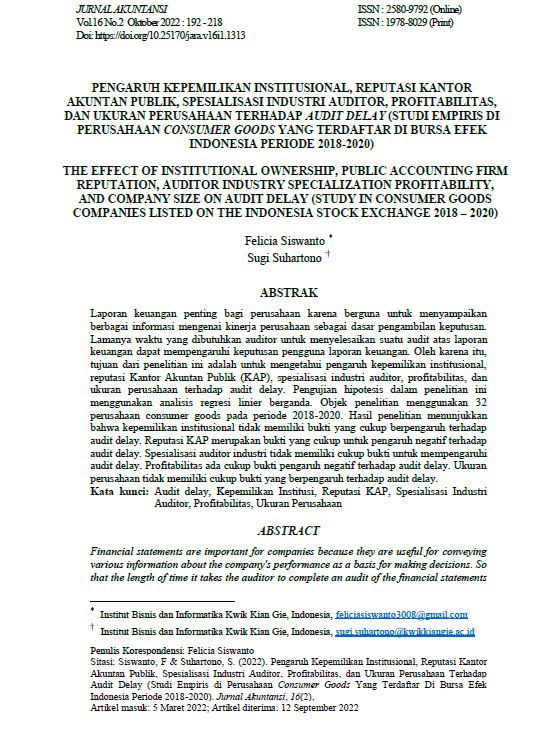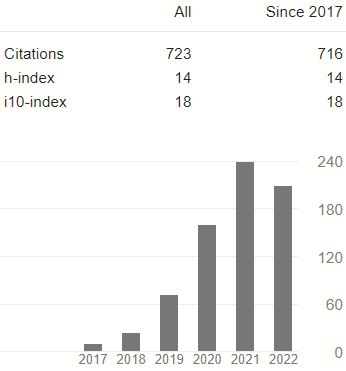PENGARUH KEPEMILIKAN INSTITUSIONAL, REPUTASI KANTOR AKUNTAN PUBLIK, SPESIALISASI INDUSTRI AUDITOR, PROFITABILITAS, DAN UKURAN PERUSAHAAN TERHADAP AUDIT DELAY (STUDI EMPIRIS DI PERUSAHAAN CONSUMER GOODS YANG TERDAFTAR DI BURSA EFEK INDONESIA PERIODE 2018-2
(Studi Empiris: Perusahaan Consumer Goods yang Terdaftar di Bursa Efek Indonesia Periode 2018-2020)
DOI:
https://doi.org/10.25170/jak.v16i2.3254Keywords:
Audit delay, Kepemilikan Institusi, Reputasi KAP, Spesialisasi Industri Auditor, Profitabilitas, Ukuran PerusahaanAbstract
Financial statements are important for companies because they are useful for conveying various information about the company's performance as a basis for making decisions. So that the length of time it takes the auditor to complete an audit of the financial statements can affect the decisions of users of financial statements. Therefore, the purpose of this study is to determine the influence of institutional ownership, KAP reputation, auditor industry specialization, profitability, and company size on audit delay. Hypothesis testing in this study used multiple linear regression analysis. The research object used 32 consumer goods companies in the period 2018-2020. The results showed that institutional ownership did not have enough evidence of an effect on audit delay. KAP reputation is sufficient evidence of negative influence on audit delay. Industry auditor specialization does not have enough evidence of an effect on audit delay. Profitability there is enough evidence of a negative effect on audit delay. The size of the company does not have enough evidence of an effect on audit delay.
References
Akerlof, G. A. (1970). The market for “lemons”: Quality uncertainty and the market mechanism. Quarterly Journal of Economics, 84(3), 488–500.
Apriyana, N. (2017). Pengaruh Profitabilitas, Solvabilitas, Ukuran Perusahaan, Dan Ukuran Kap Terhadap Audit Delay Pada Perusahaan Properti Dan Real Estate Yang Terdaftar Di Bursa Efek Indonesia Periode 2013-2015. Nominal, Barometer Riset Akuntansi Dan Manajemen, 6(2).
Arumningtyas, D. P., & Ramadhan, A. F. (2019). Pengaruh Spesialisasi Industri Kap, Reputasi Auditor, Dan Audit Tenure Terhadap Audit Report Lag. Diponegoro Journal of Accounting, 8(2), 141–153.
Charlie. (2017). Pengaruh Spesialisasi Auditor, Kepemilikan Publik, Komite Audit, dan Opini Audit terhadap Audit Delay. Jurnal Akuntansi, 6(2), 109–123.
CNBC Indonesia. (2019). Belum Sampaikan Laporan Keuangan, Ini Penjelasan AISA. Retrieved Oktober 26, 2021, from https://www.cnbcindonesia.com/market/20190110132036-17-50009/belum-sampaikan-laporan-keuangan-ini-penjelasan-aisa
Dr. Kasmir, S.E., M. M. (2019). Analisis Laporan Keuangan, Edisi Revisi, Cetakan ke-11. Depok: PT Rajagrafindo Persada.
Dwiyani, & Badera. (2017). Faktor-Faktor Yang Mempengaruhi Ketepatwaktuan Penyajian Laporan Keuangan. E-Jurnal Ekonomi Dan Bisnis Universitas Udayana, 4, 1451–1480.
Dyer, J. C., Mchugh, A. J., Iv, J. C. D., & Mchugh, A. J. (1975). The Timeliness of the Australian Annual Report times. 13(2), 204–219.
Eksandy, A. (2017). Pengaruh Ukuran Perusahaan, Solvabilitas, Profitabilitas, dan Komite Audit Terhadap Audit Delay. 1(2).
Gozali, Liany ; Harjanto, K. (2020). Pengaruh Profitabilitas, Ukuran Perusahaan, Kepemilikan Institusional dan Solvabilitas terhadap Audit Delay. Ultima Accounting, 12(2), 214–230.
Immanuel, Raymond; Yuyetta, E. N. A. (2014). Analisis Faktor-Faktor Yang Mempengaruhi Penetapan Audit Fees. Diponegoro Journal of Accounting, 3(3), 1–12.
Ikatan Akuntansi Indonesia. (2018). Standar Akuntansi Keuangan. Ikatan Akuntansi Indonesia.
Investor.ID. Kontribusi Pasar Modal terhadap Ekonomi Nasional Cukup Besar. Retriverd November 9, 2021, from https://investor.id/archive/kontribusi-pasar-modal-terhadap-ekonomi-nasional-cukup-besar
Jensen, M. C., & Meckling, W. H. (1976). Theory of the firm: Managerial behavior, agency costs and ownership structure. Corporate Governance: Values, Ethics and Leadership, 77–132.
Khairunnisa, A. F., & Syafruddin, M. (2021). Pengaruh Reputasi Auditor Dan Spesialisasi Industri Auditor Terhadap Audit Report Lag (Studi Empiris Pada Perusahaan Manufaktur Yang Terdaftar Di Bei Tahun 2016 Dan 2017).Diponegoro Journal of Accounting, 10(2), 1–12.
Lestari, Kadek Ayu Nia dan Saitri, P. W. (2017). Analisis Pengaruh Ukuran Perusahaan, Profitabilitas, Solvabilitas, Kualitas Auditor dan Audit Tenure Terhadap Audit Delay pada Perusahaan Manufaktur di Bursa Efek Indonesia Periode 2012-2015. Jurnal Ilmiah Manajemen & Akuntansi, 23(1), 1–11.
Margaretha, C., & Suhartono, S. (2016). Kemampuan Ukuran Perusahaan Memoderasi Determinan Audit Delay. Auditing, 5(2), 185–204.
Michael, C., & Rohman, A. (2017). Pengaruh Audit Tenure dan Ukuran KAP Terhadap Audit Report Lag dengan Spesialisasi Industri Auditor sebagai Variabel Moderasi (Studi Empiris pada Perusahaan Manufaktur yang Terdaftar di Bursa Efek Indonesia tahun 2013-2015). Diponegoro Journal of Accounting, 6(4), 378–389.
Neal, T. L., & Riley, R. R. (2004). Auditor industry specialist research design. Auditing: A Journal of Practice and Theory, 23(2), 169–177.
Novari, P. M., & Lestari, dan P. V. (2016). Pengaruh Ukuran Perusahaan, Leverage, dan Profitabilitas terhadap Nilai Perusahaan pada Sektor Properti dan Real Estate. E-Jurnal Manajemen Unud, 5(9), 5671–5694.
Pangerapan, S., & Clarissa, S. (2019). Pengaruh Ukuran Perusahaan, Solvabilitas, Profitabilitas, dan Ukuran KAP terhadap Audit Delay pada Perusahaan Sektor Pertambangan yang Terdaftar di Bursa Efek Indonesia. Jurnal EMBA, 7(3), 3069–3078.
Pattinaja, E. M., & Siahainenia, P. P. (2020). Pengaruh Ukuran Perusahaan, Opini Auditor dan Umur Perusahaan Terhadap Audit Delay. Accounting Research Unit: ARU Journal, 1(1), 13–22.
Prameswari, A.S dan Yustrianthe, R. . (2015). Analisis Faktor-Faktor yang Memengaruhi Audit delay (Studi Empiris pada Perusahaan Manufaktur yang Terdaftar di Bursa Efek Indonesia). Jurnal Akuntansi, 19(1), 50–67.
Praptitorini, M. D., & Januarti, I. (2011). Analisis Pengaruh Kualitas Audit, Debt Default Dan Opinion Shopping Terhadap Penerimaan Opini Going Concern. Jurnal Akuntansi Dan Keuangan Indonesia, 8(1), 78–93.
Prastiwi, Putri Intan; Astuti, Dewi Saptantinah Puji; Harimurti, F. (2018). Pengaruh Ukuran Perusahaan, Leverages, Sistem Pengendalian Internal, dan Reputasi Auditor terhadap Audit Delay dengan Audit Tenure sebagai Variabel Moderasi. Jurnal Akuntansi Dan Sistem Teknologi Informasi, 14(1), 89–99.
Primantara, I Made Dwi dan Rasmini, N. K. (2015). Pengaruh Jenis Industri, Spesialisasi Industri Auditor, dan Opini Auditor Pada Audit Delay. E-Jurnal Akuntansi Universitas Udayana, 13(3), 1001–1028.
Putri, C. D., & Yusuf, M. (2020). Pengaruh Laba Rugi, Kepemilikan Manajerial, Kepemilikan Institusional, dan Audit Tenure terhadap Audit Report Lag (Studi Empiris Pada Perusahaan Property dan Real Estate Yang Terdaftar di Bursa Efek Indonesia Periode 2016-2019). STIE Jakarta, 1–23.
Ramadhani, J. (2017). Pengaruh Ukuran Perusahaan, Profitabilitas, Ukuran KAP, Subsidiaries, dan Komite Audit terhadap Audit Delay. Universitas Muhammadiyah Surakarta, 1–11.
Ratnasari, S. N. Y. (2017). Pengaruh Ukuran Perusahaan, Ukuran Kap Dan Auditor Internal Terhadap Audit Delay. Jurnal Akuntansi, 5(2), 159–166.
Raya, V. J., & Laksito, H. (2020). Pengaruh Spesialisasi Industri Auditor Dan Reputasi Auditor Terhadap Audit Report Lag ( Studi Empiris Pada Perusahaan Perbankan yang Terdaftar di BEI Tahun 2016 , 2017 dan 2018 ). Diponegoro Journal of Accounting, 9(3), 1–10.
Republik Indonesia (2011). Undang-Undang Republik Indonesia Nomor 5 Tahun 2011 Tentang Akuntan Publik. Jakarta
Republik Indonesia (2016). Peraturan Otoritas Jasa Keuangan Nomor 29/POJK.04/2016 Tentang Laporan Tahunan Emiten atau Perusahaan Publik. Jakarta
Republik Indonesia (2017). Peraturan Otoritas Jasa Keuangan Nomor 11/POJK.04/2017 Tentang Laporan Kepemilikan atau Setiap Perubahan Kepemilikan Saham Perusahaan Terbuka. Jakarta
Saleh, R., & Susilowati, I. (2004). Studi Empiris Ketepatan Waktu Pelaporan Keuangan Perusahaan Manufaktur Di Bursa Efek Jakarta. Jurnal Bisnis Strategi, 13, 66–80.
Sari, H. K. (2016). Faktor-Faktor Yang Mempengaruhi Audit Delay Pada Perusahaan Manufaktur Tahun 2010-2014. Jurnal IImu Dan Riset Akuntansi, 5, 12–26.
Sebriwahyuni, R. A., & Kurniawan, B. (2020). Analisis Pengaruh Struktur Kepemilikan dan Pertumbuhan Perusahaan terhadap Keterlambatan Audit. Global Financial Accounting Journal, 4(1), 29.
Soedarsa, H. G. (2017). Pengaruh Faktor Internal dan Eksternal Pada Audit Delay. Jurnal Akuntansi Dan Keuangan, 8(2), 1–23.
Spence, M. (1973). Job Market Signalling. The Quarterly Journal of Economics, 87(3), 355–374.
Suparsada, N.P.Y.D dan Putri, I. A. D. (2017). Pengaruh Profitabilitas, Reputasi Auditor, Ukuran Perusahaan, dan Kepemilikan Institusional terhadap Audit Delay pada Perusahaan Manufaktur. E-Jurnal Akuntansi Universitas Udayana, 18(1), 60–87.
Suwardjono. (2005). Teori Akuntansi Perekayasaan Pelaporan Keuangan.Edisi Ketiga, Cetakan Pertama. Yogyakarta.
Utomo, M. B., & Sawitri, A. P. (2021). Pengaruh KAP Big Four , Komite Audit Dan Kepemilikan Institusional Terhadap Audit Delay. Majalah Ekonomi: Telaah Manajemen, Akuntansi Dan Bisnis, 26(1), 90–94.
Verawati, Ni Made Adhika; Wirakusuma, M. G. (2016). Pengaruh Pergantian Auditor, Reputasi KAP, Opini Audit, dan Komite Audit pada Audit Delay. E-Jurnal Akuntansi Universitas Udayana, 17(2).
Witjaksono, Armanto dan Silvia, M. (2017). Analisis Faktor-Faktor Yang Berpengaruh Terhadap Audit Delay Pada Perusahaan Consumer Goods Yang Terdaftar di Bursa Efek Indonesia Periode 2010-2013. Jurnal Akuntansi.

Downloads
Published
Issue
Section
License
Authors who publish with this journal agree to the following terms:
- Authors retain copyright and grant the journal right of first publication with the work simultaneously licensed under a Creative Commons Attribution-ShareAlike 4.0 International License that allows others to share the work with an acknowledgment of the work's authorship and initial publication in this journal.
- Authors are able to enter into separate, additional contractual arrangements for the non-exclusive distribution of the journal's published version of the work (e.g., post it to an institutional repository or publish it in a book), with an acknowledgment of its initial publication in this journal.
- Authors are permitted and encouraged to post their work online (e.g., in institutional repositories or on their website) prior to and during the submission process, as it can lead to productive exchanges, as well as earlier and greater citation of published work.














